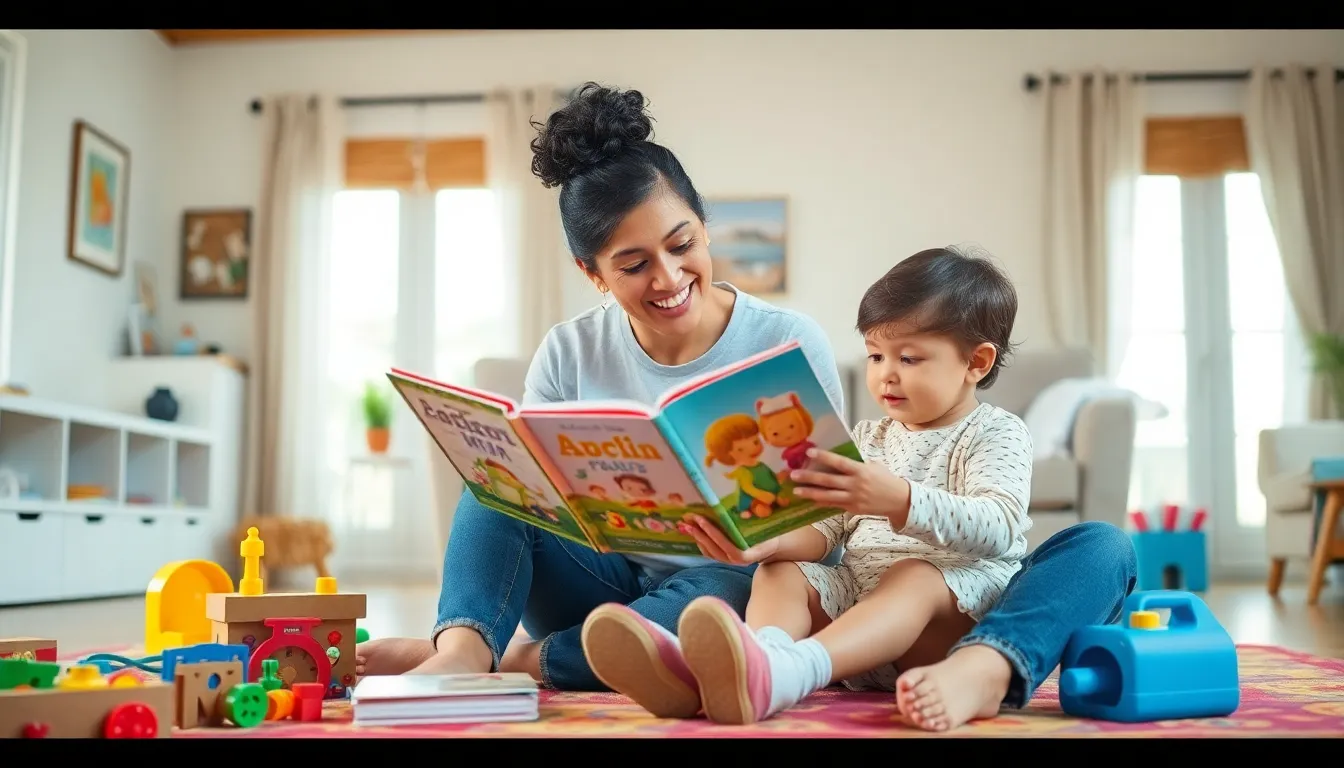In a world where toddlers can already navigate a tablet better than most adults, why not give them a head start in language learning? Parent-led language learning isn’t just a trend; it’s a golden opportunity for families to bond while boosting their child’s linguistic skills. Imagine your little one impressing their friends with words in multiple languages—talk about a cool kid on the block!
Table of Contents
ToggleOverview of Parent-Led Language Learning
Parent-led language learning involves engaging children in language acquisition through guided interactions. This method promotes active participation, where children learn vocabulary, pronunciation, and grammar from their caregivers. Research shows that children exposed to multiple languages at an early age develop stronger cognitive skills and enhanced problem-solving abilities.
Parents play a crucial role by incorporating languages into daily routines. They can use storytelling, songs, and conversations to create immersive environments. Through these activities, toddlers naturally absorb language patterns and cultural nuances associated with each language.
Active engagement through parental involvement reinforces language retention. Consistency in these practices leads to more significant language advantages. Studies indicate that bilingual children often demonstrate better academic performance and improved social skills compared to their monolingual peers.
Resources supporting parent-led language learning are widely accessible. Language apps and educational games offer interactive methods for practicing vocabulary and pronunciation. Moreover, local community programs often provide language classes designed specifically for families.
Choosing the right approach depends on each child’s learning style and interests. Some children respond well to visual stimuli, while others thrive in auditory environments. Tailoring language activities to fit a child’s preferences ensures more effective learning outcomes.
Establishing a supportive atmosphere encourages children to express themselves freely in their new language. Celebrating small milestones fosters confidence and motivates continued learning. By prioritizing communication and engagement, parents create a foundation for lifelong language skills.
Benefits of Parent-Led Language Learning

Parent-led language learning offers substantial benefits for toddlers, including cognitive advantages and enhanced social skills.
Cognitive Development
Cognitive development significantly benefits from parent-led language learning. Research indicates early exposure to multiple languages strengthens problem-solving skills and overall cognitive abilities. Active engagement in guided interactions fosters critical thinking as toddlers learn new vocabulary and grammar. Different brain pathways develop when children switch between languages, promoting flexibility in thought processes. Furthermore, bilingual individuals often excel in tasks requiring multitasking. Integrating storytelling and songs in different languages creates immersive experiences, maximizing language absorption. Strong cognitive foundations formed during early childhood can influence academic performance later on.
Social Skills Enhancement
Social skills enhancement plays a crucial role in parent-led language learning. Children exposed to multiple languages often exhibit better communication skills and increased empathy. Natural interactions during language practice encourage toddlers to express themselves clearly while understanding cultural nuances. Engagement with peers and family members facilitates social bonding rooted in shared language experiences. Children build confidence as they successfully navigate conversations in a new language, promoting emotional growth. Supportive environments where parents celebrate language milestones lead to a positive learning atmosphere. As toddlers develop their social skills, they become more adaptable in diverse social settings.
Effective Strategies for Parents
Creating a conducive environment enhances language learning. Surrounding toddlers with diverse vocabulary and engaging materials fosters natural language acquisition. Parents can decorate rooms with labels on objects, promoting word recognition through visual aids. Engaging in daily conversations about various topics also reinforces language skills. Regularly reading books aloud and discussing illustrations deepens comprehension and sparks curiosity.
Incorporating play and music significantly boosts language retention. Children respond positively to playful interactions that make learning enjoyable. Singing songs exposes them to rhythms and sounds of the language, making vocabulary acquisition entertaining. Utilizing educational games encourages practice in a fun, relaxed atmosphere. These activities not only stimulate language skills but also enhance cognitive and social development. Creating memorable experiences through music and play ensures children are engaged, eager to learn, and confident in their language abilities.
Challenges in Parent-Led Language Learning
Parent-led language learning presents several challenges that can impede the process. Time constraints often hinder parents from dedicating consistent moments to language practice. Busy schedules impact availability for engaging activities. Balancing work, household duties, and other responsibilities makes it difficult to prioritize language learning.
Language proficiency concerns can also arise. Some parents may lack fluency in the target language, impacting their ability to teach effectively. Limited proficiency can lead to inaccuracies in pronunciation and grammar. This, in turn, may affect the child’s language acquisition and confidence. Seeking resources or support from language programs can bridge this gap. Parents can enhance their own language skills while providing a more robust learning environment for their children.
Parent-led language learning offers numerous advantages that extend beyond linguistic skills. It fosters a deeper connection between parents and children while laying the groundwork for cognitive and social development. By creating immersive environments and incorporating playful elements, parents can make language learning a joyful experience.
The journey of teaching toddlers multiple languages not only enhances their communication abilities but also nurtures their empathy and problem-solving skills. With the right strategies and resources, parents can overcome challenges and ensure their children thrive in diverse linguistic landscapes. Embracing this approach can lead to lifelong benefits that empower children in their academic and social endeavors.



